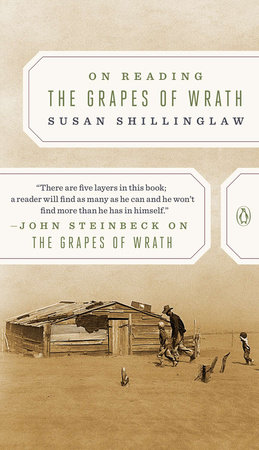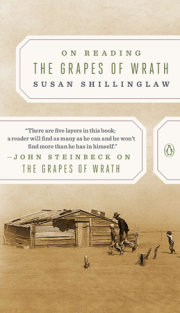“[Shillinglaw is] a scintillating guide. Shillinglaw explores the novel’s layers of meaning, richly mining cultural context, history, and social thought, as well as Steinbeck’s own background, work process, and politics. The captivating result resembles an extended college lecture series, appealingly combining personal reflections and a conversational tone with accessible scholarship.”
—Publisher's Weekly (Book of the Week Selection)
"Shillinglaw provides, moreover, a richly detailed account of the growth of
The Grapes of Wrath...This book will appeal to serious students of Steinbeck’s work, particularly those interested in his connection to ecology and the environmental movement."
—Library Journal
"In Shillinglaw, Steinbeck, who died in 1968, has an ardent reader, dedicated to the urgency and everlasting timeliness of the author's work. More than the Nobel Prize, the Pulitzer Prize, the National Book Award and countless other decorations, this would have mattered to him.
"—Newsday
"A concise yet penetrating study of the genesis of the book and its interlocking themes...[Shillinglaw is] an astute critic."
—Bookpage
"As Shillinglaw so well demonstrates,
Grapes is not only “an urgent book,” but it is also a work of art that has withstood the test of time. Her own
On Reading The Grapes of Wrath has enduring merit as well; like a good teacher, it instructs and delights. With its accompanying notes, Shillinglaw’s little 206-page tome is such a learning experience—invaluable for teaching, researching, and understanding more fully the complexity of
Grapes, with its multiple layers of content and meaning."
—Steinbeck Review
"Nobody who’s ever managed to enjoy
The Grapes of Wrath should miss this powerfully memorable little study of it."
—Open Letters Monthly
"Longtime Steinbeck fans and first-time readers alike will find much to enrich their understanding of The Grapes of Wrath in Shillinglaw's book."
—Tampa Bay times
"For those familiar with the novel, try reading this book and then return for a rereading of Steinbeck’s classic. You will find it a much more rewarding experience after you have pondered the contents of Shillinglaw’s book."
—The Salinas Californian
"Susan Shillinglaw brings [the power of Steinbeck's novel] out beautifully in her excellent On Reading The Grapes of Wrath."
—Shelf Awareness




